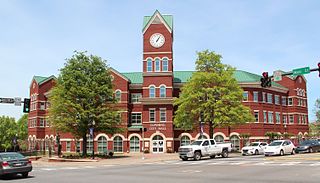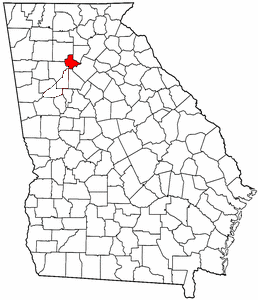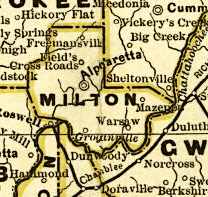
Gordon County is a county in the Northwest region of the U.S. state of Georgia. As of the 2020 census, the population was 57,544. The county seat is Calhoun. Gordon County comprises the Calhoun, GA Micropolitan Statistical Area, which is included in the Atlanta–Athens-Clarke County–Sandy Springs, GA-AL CSA.

Fulton County is a county in the north-central portion of the U.S. state of Georgia. As of the 2020 United States census, the population was 1,066,710, making it the state's most populous county. Its county seat and most populous city is Atlanta, the state capital. About 90% of the city of Atlanta is within Fulton County; the remaining portion is in DeKalb County. Fulton County is the principal county of the Atlanta–Sandy Springs–Roswell metropolitan statistical area.

Cherokee County is located in the US state of Georgia. As of the 2020 Census, the population was 266,620. The county seat is Canton. The county Board of Commissioners is the governing body, with members elected to office. Cherokee County is included in the Atlanta Metropolitan Area.

Tyrone is a town in Fayette County, Georgia, United States. The population was 7,658 in 2020. The estimated population in 2018 was 7,388. It is a part of the Atlanta metropolitan area.

Cumming is a city in and the county seat of Forsyth County, Georgia, United States, and the sole incorporated area in the county. It is a suburban city, and part of the Atlanta metropolitan area. In the 2020 census, the population is 7,318, up from 5,430 in 2010. Surrounding unincorporated areas with a Cumming mailing address have a population of approximately 100,000.

Alpharetta is a city in northern Fulton County, Georgia, United States, and part of the Atlanta metropolitan area. As of the 2020 U.S. census, Alpharetta's population was 65,818; in 2010, the population had been 57,551.

Fairburn is a city in Fulton County, Georgia, United States, with a population of 16,483, according to the 2020 census. Though it has a rich history of its own, the city is now a closely linked suburb of Atlanta, which lies just 17 miles to the north.

Roswell is a city in northern Fulton County, Georgia, United States. At the official 2020 census, the city had a population of 92,883, making Roswell the state's ninth largest city. A suburb of Atlanta, Roswell has an affluent historic district.

Sandy Springs is a city in northern Fulton County, Georgia, United States, and a suburb of Atlanta. The city's population was 108,080 at the 2020 census, making it Georgia's 7th most populous city. It is the site of several corporate headquarters, including UPS, Newell Brands, Inspire Brands, Focus Brands, Cox Enterprises, and Mercedes-Benz USA's corporate offices.

Milton County was a county of the U.S. state of Georgia from 1857 to 1931. It was created on December 18, 1857, from parts of northeastern Cobb, southeastern Cherokee, and southwestern Forsyth counties. The county was named for John Milton, Secretary of State of Georgia from 1777 to 1799. Alpharetta was the county seat until the end of 1931, when Milton was merged with Fulton County to save it from bankruptcy during the Great Depression. At that time, Campbell County, which had already gone bankrupt, was also ceded to Fulton, giving it its 70-mile (110 km) long irregular shape along the Chattahoochee River.

The Fulton County School System is a school district headquartered in Sandy Springs, Georgia, United States. The system serves the area of Fulton County outside the Atlanta city limits. Fulton County Schools serve the cities of Alpharetta, Johns Creek, Milton, Mountain Park, Roswell, and Sandy Springs north of Atlanta, and Chattahoochee Hills, College Park, East Point, Fairburn, Hapeville, Palmetto, Union City, South Fulton, and Fulton's remaining unincorporated areas in the south. Fulton County is the fourth-largest school system in Georgia.
Georgia's 6th congressional district is a congressional district in the U.S. state of Georgia. As of 2023, it is represented by Republican Rich McCormick. Previously represented by Democrat Lucy McBath, the district's boundaries were redrawn following the 2020 census to be significantly more Republican-leaning than it had been in the previous decade. As a result, McBath announced that she would be running against Carolyn Bourdeaux in the Democratic primary in the neighboring 7th congressional district, which she subsequently won. Rich McCormick defeated Democrat Bob Christian for the seat in the 2022 congressional elections, took office on January 3, 2023.. It is the wealthiest congressional district in the state of Georgia.

State Route 140 (SR 140) is a 78.6-mile-long (126.5 km) state highway in the northwestern part of the U.S. state of Georgia. It connects the Armuchee and Peachtree Corners areas, within portions of Floyd, Bartow, Cherokee, Fulton, Gwinnett counties.

Johns Creek is a city in Fulton County, Georgia, United States. According to the 2020 census, the population was 82,453. The city is a northeastern suburb of Atlanta.

State Route 372 (SR 372) is a 27.128-mile-long (43.658 km) state highway in the north-central part of the U.S. state of Georgia. It begins at an intersection with SR 140 in the western part of Alpharetta, Georgia and travels to the north through Fulton and Cherokee counties to end at I-575/SR 5/SR 515 in the very southern portion of south-central Pickens County.

Centered today at the crossroads of Georgia Highways 140 and 372, Crabapple, Georgia, is one of the oldest parts of Fulton County, Georgia. Originally part of Cherokee County, Georgia,, Crabapple was part of the land contributed in 1857 to form Milton County, Georgia. The first permanent settlement at Crabapple was made in 1874, with the community taking its name from a crabapple tree near the original town site. As a result of the Great Depression, Milton County was later absorbed into Fulton County in 1932. The historic heart of Crabapple is anchored by an historic brick building at the crossroads of Crabapple Road-Mayfield Road, Birmingham Road-Broadwell Road, and Mid-Broadwell Road. In 2006, a portion of Crabapple was one of several communities incorporated into the new city of Milton. Crabapple is now split between the cities of Milton, Roswell, and Alpharetta.
Jan Slaughter Jones is an American politician in Georgia. A Republican, she has been a member of the Georgia House of Representatives since 2003, and was acting Speaker of the House from November 2022 to January 2023 following the death of former Speaker David Ralston. Jones serves as Speaker pro tempore of the House, a position she has held continuously since 2010 with the exception of her brief stint as acting Speaker. She is the state representative for Georgia's 47th House district, which covers some of the northern Atlanta suburbs, including parts of Milton, Roswell, Alpharetta, Mountain Park, and unincorporated Cherokee County.

South Fulton is a city in Fulton County, Georgia, United States in the Atlanta metropolitan area. It was incorporated in 2017 from parts of southwest Fulton County and includes the communities of Red Oak, Cooks Crossing, Stonewall, Fife, Ben Hill, Sandtown, Cliftondale, Ono, Cedar Grove, Boat Rock/Dry Pond, Maude, Lester, Enon, Welcome All, Peters Woods, and part of Campbellton. As of 2020, it had a population of 107,436, making it the state's eighth-largest city in population. As of 2020, South Fulton has the highest African American percentage of any U.S. city over 100,000, surpassing highly African American cities such as Detroit and Jackson.

Alpharetta High School is a public high school located in Alpharetta, Georgia, United States within the Fulton County School System. Atlanta Magazine named Alpharetta High School one of the metro Atlanta area's best all-around high schools. In 2020, the U.S. News & World Report ranked the school #7 in Georgia and #281 nationally.

Metro Atlanta, designated by the United States Office of Management and Budget as the Atlanta–Sandy Springs–Roswell metropolitan statistical area, is the most populous metropolitan statistical area in the U.S. state of Georgia and the sixth-largest in the United States, based on the July 1, 2023 metropolitan area population estimates from the U.S. Census Bureau. Its economic, cultural, and demographic center is Atlanta, and its total population was 6,307,261 in the 2023 estimate from the U.S. Census Bureau.

























